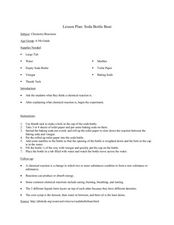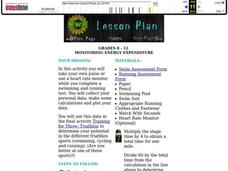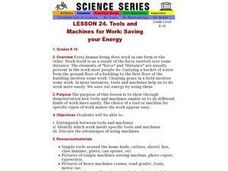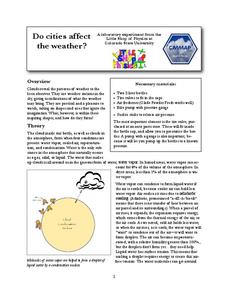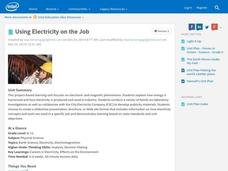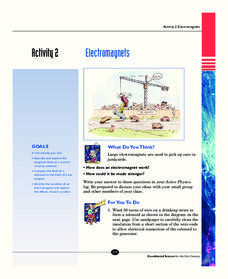Curated OER
What is Weather?
In this weather worksheet, students photograph and record the weather conditions for a week. Then they list the types of clouds observed and the weather conditions they noted associated with each cloud type. Students also write a...
Curated OER
Kingdom Fungi
In this kingdom fungi instructional activity, learners conduct an experiment creating and observing dough. They describe what happened to the dough while they observed it and name the type of fungus is the yeast added. Students also...
Curated OER
Solar System
Students analyze theories on how the solar system was formed. In this solar system lesson students explain the rotation and revolution of motion.
Curated OER
Soda Bottle Boat
Learners explore chemical reactions. In this chemical reaction lesson, students conduct an experiment observing chemical reactions.
Curated OER
Heating
Students develop the idea that heat is a form of energy which moves from hot objects to cold ones.
Curated OER
Webbing out Electricity
Fourth graders identify electricity as a form of energy that is associated with common household products. They utilize technology as an aid in which they can graphically organize their thoughts.
Curated OER
An Introduction to Space Radiation
In this space radiation worksheet, students read about the various types of radiation humans are exposed to. Students answer 5 questions based on the reading. They calculate the amount of energy gained when exposed to a certain amount of...
Curated OER
The Energy of Life in Zebrafish
Learners study the stages of development of an unknown organism. In this zebrafish lesson, students examine and collect data as they use microscopes to view a zebrafish embryo.
Curated OER
Monitoring Energy Expenditure
Students use heart rate monitors and complete a swimming and running test. These tests allow students to obtain personal data, to manipulate the data through calculations of various parameters, and to graphically represent the data.
Curated OER
Tools and Machines for Work: Saving your Energy
Students consider how tools and machines can make work easier. They examine specific tools for making work easier.
Curated OER
Energy/Light/Heat/Sound
Fourth graders study the properties of heat in this series of lessons. They discuss sources of heat and experiment to determine its properties. They identify insulators and conductors by measuring temperatures, and graphing their data....
Colorado State University
Do Cities Affect the Weather? (Making a Cloud in a Bottle)
The dynamics of a city can have a drastic effect on the weather. A hands-on lesson asks learners to build a model to illustrate how city pollution provides a nucleus for condensation. The greater the pollution, the greater chance for...
Cornell University
Catapults
Ready, aim, fire! Launch to a new level of understanding as scholars build and test their own catapults. Learners explore lever design and how adjusting the fulcrum changes the outcome.
Space Awareness
Climate Zones
The climate at the equator is hotter than the climate at the poles, but why? The lesson goes in depth, explaining how the angles of illumination relate to the heating rate at different latitudes and seasons. Scholars use a strong lamp,...
Teach Engineering
Quantum Dots and Colors
Introduce teams to quantum dot solutions with an activity that has them expose solutions to a blacklight, observe the colors, and take measurements. Groups graph the data and analyze the dependence between particle size and color...
Cornell University
Atomic Bonding
Explore the connection of surface area to bonding within atoms. Learners complete lab investigations to model changing surface area with different sizes and concentrations of atoms. A flour fireball demonstration follows the labs to...
Teach Engineering
Flame Test: Red, Green, Blue, Violet?
Let the true colors shine through. Pupils conduct a flame test to identify an unknown element. Class members calculate and prepare specific molarity solutions of three chemicals. Using their observations of the colors emitted, they...
Mr. E. Science
Chemical Reactions
Once I told a chemistry joke, but there was no reaction. Get young chemists involved in changes and reactions with a presentation that begins with physical and chemical changes and chemical reactions. It moves on to chemical equations...
Teach Engineering
May the Force Be With You: Drag
Do not let friction drag you down! The 11th segment in a series of 22 focuses on the fourth force acting upon an airplane—drag. Pupils learn about the effects and causes of drag.
Agriculture in the Classroom
Six Kinds Do It All
Teach young engineers that all machines, no matter how complicated or complex, are made up of just six simple devices with this hands-on physical science lesson. Using the included templates, students first create paper models of...
Intel
Using Electricity on the Job
Learners explore electricity, discussing its importance and researching different ways in which electricity can be generated. Groups present their findings to the class and then create publicity materials which promote and educate about...
J. Paul Getty Trust
O Greek Shape! O Fair Pose!
Everything old is new again. The Los Angeles J. Paul Getty Museum presents a lesson on how Greek black-figure painting influenced eighteenth century Neoclassical artists. After looking at a series of examples, class members create their...
Next Generation Science Storylines
How Can We Sense so Many Different Sounds from a Distance?
Dive into the mystery of sound waves! Scholars brainstorm questions about how sound travels and why different items make different sounds. They then conduct experiments to answer their questions.
It's About Time
Electromagnets
Young scientists build their own electromagnet and test it by picking up paperclips. Analysis questions evaluate knowledge at the end of the activity.





